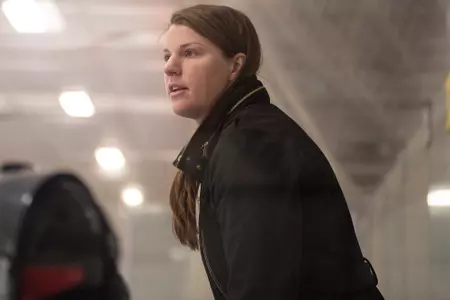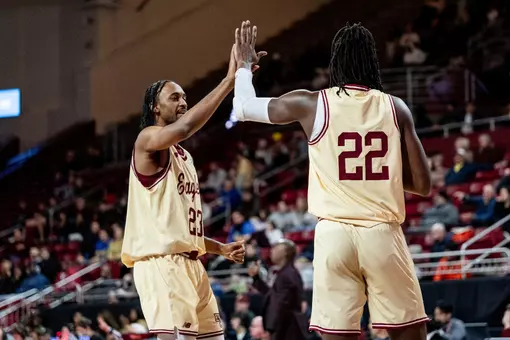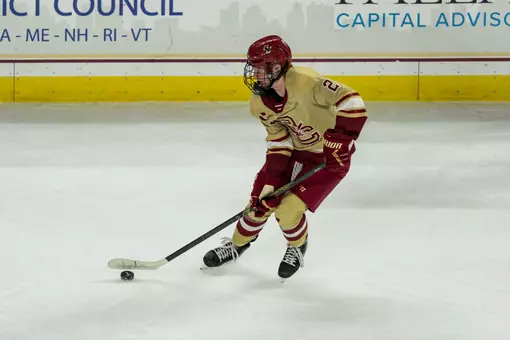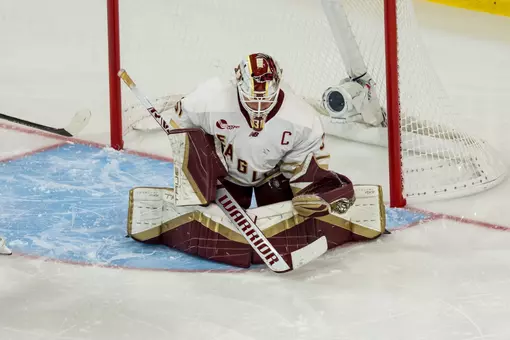
Photo by: Suffolk Athletics
Once An Eagle, Always An Eagle: Taylor Wasylk '14
January 25, 2020 | Women's Hockey, #ForBoston Files
The former ice hockey great is committed to growing women's hockey as the first coach of Suffolk.
Taylor Wasylk still hears her old head coach every now and then.
She will watch a hockey play develop, and Katie Crowley still calls out the orders in her mind. She still knows exactly what Courtney Kennedy would adjust in a given moment, and if she blinks hard enough, she can still imagine the battles between Boston College and Boston University at Conte Forum or Walter Brown Arena.
The game, though, isn't BC-BU, and Wasylk can't jump over the boards to make a play for her team. She's the one standing behind the bench now, playing the role her old coaches taught her as the head coach of the Suffolk Rams women's ice hockey team, an upstart Division III team in the newly-formed New England Hockey Conference.
"She was a great player when she was here," Crowley said of her former charge. "When she told me that she was going to go that coaching route, it just showed me how she cared about the game. She was a really good player, and it's really nice to see a good player give back to the sport as a coach. This is a sport that gave (those athletes) so much, and I think it's really to see Taylor coaching."
"I had done some skills clinics to make some pocket money but never anticipated becoming a coach," Wasylk said. "I took the summer off after I graduated to be a 'normal person' without training to be an athlete. I remember calling it my 'Summer of Fun' because I didn't have to be on the ice for the first time in 10 years. At the end of the summer, though, I started looking for jobs, and Courtney Kennedy reached out, asking me if I was interested in coaching at Division III. She connected me with Colleen Harris, and I loved it. I still remember being nervous the first time I drew up my first drill, and it took me a few days to find my voice. I think my hands shook like crazy, but after a couple of days, I fell in love with it and I can't explain why."
In 2016, Suffolk University announced the addition of six different varsity sports, including women's hockey. It was a completely new undertaking for the institution, which sponsored the sport for men's hockey since the 1980s but never so much as had a club women's team. It ultimately coincided with the formation of the New England Hockey Conference's women's side, which began play in 2015, two years before the Rams became a full Division III program.
Starting a program from a bare ground level is a massive project, especially in a league and region known nationally for its hockey competitiveness and culture. A search led the team to Wasylk, who was, at the time, coaching at SUNY Canton after a year as an assistant coach with Harris' Beacons.
"I started the year before our first season," Wasylk said. "I started working on the team in the spring of 2017, and it was a very long year to start from scratch. There was nothing, but it was awesome. When there's a club team, a team can just bring kids along with it, but coaches run into a situation where kids might get cut. I didn't want to have someone feeling like we were just biding time until we replaced them. Some people might think that's crazy, but I was really happy to be in a situation where we didn't have anything to start."
The lack of everything forced Wasylk to find her voice as a recruiter and a coach. By the time the first game rolled around in the fall of 2018, she had 23 skaters on the roster, including two sophomores, a junior transfer and a senior. The team also found a home rink across the Mystic River in East Boston, while dropping into the NEHC's women's division formed in 2015.
"We had almost 25 players, the majority of which were freshmen," Wasylk said. "I had two girls that were already at Suffolk, and we had some transfers who were able to come in as a senior or juniors. It gave us a mix for that first year, and we were lucky to have an upper-class presence for leadership on the ice and in the locker room. I went out with the attitude that I was going to make the best available players say no to me. I just went out recruiting with a vision that we could be the best before they graduate.
"That said, Suffolk draws a sizeable chunk of its students from first-generation kids from Boston," she said, "and our first year, we didn't have a single Massachusetts kid. That surprised everyone. We recruited kids from all over the United States and Canada, from Ontario to Alberta to Michigan and California."
It made for a really impactful first season. Preseason polls predicted a mid-tier finish, but the Rams surprised everyone by going on a 7-1-1 run in their schedule's early portion. They finished their inaugural season well over .500 with 15 wins and hosted UMass-Boston in the playoffs.
"Her team did really well in its first year," Crowley said. "She took on the challenge and got excited about it. She was excited for that opportunity to find players to fit her mold and do what she was looking for. You're filling your team, but you have to keep filling on the back end year after year. I was just impressed with her poise and how nothing rattled her through all of that. That's what she was like as a player, just working hard to push through it. And it's impressive because she's so young."
That first season set a precedent for Wasylk, a blue-collar, 200-foot hockey player who enjoyed mounds of success with the Eagles. She scored on her first shift of her first home game of her college career in 2010 and parlayed the next 140-plus games into one of BC's most solid four-year careers. Her teams went to three consecutive Frozen Fours, and in 2014, Wasylk earned Best Defensive Forward honors in Hockey East, along with the Beanpot MVP award.
Upon her graduation, Wasylk ranked among the team's elite ranks in game-winning goals, shorthanded goals, shots on goal and games played.
"We loved how hard she worked on a daily basis," Crowley said. "She never gave up on the ice. You could see (her work ethic), even though you don't always see it at that level (during recruitment). Some players don't always have to get back to play defense when they're the best player on the ice, but she was that typical power forward that we don't see all that much anymore. She was big and strong and unafraid to take pucks to the net. She worked hard on special teams and in the defensive zone. She learned that in college, and I'm sure she takes that to coaching."
"The players understand that I've been where they are," Wasylk said. "I know there are good games and bad games. People are going to make poor decisions here and there. I get that, and I'm very realistic. I try to be approachable. It wasn't that long ago that I was there, even though my kids think I'm ancient," she added with a laugh.
It's a big reason why Suffolk feels like an extension of the Boston College women's hockey culture. Wasylk's class played in three Frozen Fours and attended national tournaments every year. She played with gold medalists and Olympians, and her graduating class was one of the first pieces of the women's hockey revolution currently going on in the sport. It's a trail blazed by the generation that won medals in Nagano and Salt Lake City and created the culture for Turin, Vancouver and Sochi. Wasylk's peers are now the ones spreading hockey culture throughout the United States behind the gold medal won in 2018 in Pyeongchang.
"Every four years, the game gets a huge boost with the Olympics," Crowley said. "There's more being televised, and it's still growing. Our national championship game is televised, and it helps the sport grow. But now we're seeing our former players get into coaching. That's involvement that helps grow the game, and it's special. They care so much about the sport and the players in their programs. You hope they continue to do that because people like Taylor are special. They know where they came from, and they care about how to represent themselves. That helps grow this sport, and it's one of the things that for those of us in it, people like her are doing it."
"It's really fun for me to see these kids develop," Wasylk said. "They wanted to win a few more games last year, but we were all rookies last year. We were all doing this for the first time. There were lots of learning experiences, and we're still learning. We can play phenomenal. We tied Trinity, which is a better program than where we are right now, and I don't think I've ever been more excited for a tie."
"My coaches are still a sounding board for me," she added. "I know I can talk to them for advice. I had a player earlier this year that just wasn't doing what I wanted her to do in front of the net, so I had to call someone and ask what to do to make it a repetitive thing. They're still there for me with ideas and questions. At some point, I want to grow out of that, but they've been great to me since I was an Eagle and even in the years after."
She will watch a hockey play develop, and Katie Crowley still calls out the orders in her mind. She still knows exactly what Courtney Kennedy would adjust in a given moment, and if she blinks hard enough, she can still imagine the battles between Boston College and Boston University at Conte Forum or Walter Brown Arena.
The game, though, isn't BC-BU, and Wasylk can't jump over the boards to make a play for her team. She's the one standing behind the bench now, playing the role her old coaches taught her as the head coach of the Suffolk Rams women's ice hockey team, an upstart Division III team in the newly-formed New England Hockey Conference.
"She was a great player when she was here," Crowley said of her former charge. "When she told me that she was going to go that coaching route, it just showed me how she cared about the game. She was a really good player, and it's really nice to see a good player give back to the sport as a coach. This is a sport that gave (those athletes) so much, and I think it's really to see Taylor coaching."
"I had done some skills clinics to make some pocket money but never anticipated becoming a coach," Wasylk said. "I took the summer off after I graduated to be a 'normal person' without training to be an athlete. I remember calling it my 'Summer of Fun' because I didn't have to be on the ice for the first time in 10 years. At the end of the summer, though, I started looking for jobs, and Courtney Kennedy reached out, asking me if I was interested in coaching at Division III. She connected me with Colleen Harris, and I loved it. I still remember being nervous the first time I drew up my first drill, and it took me a few days to find my voice. I think my hands shook like crazy, but after a couple of days, I fell in love with it and I can't explain why."
In 2016, Suffolk University announced the addition of six different varsity sports, including women's hockey. It was a completely new undertaking for the institution, which sponsored the sport for men's hockey since the 1980s but never so much as had a club women's team. It ultimately coincided with the formation of the New England Hockey Conference's women's side, which began play in 2015, two years before the Rams became a full Division III program.
Starting a program from a bare ground level is a massive project, especially in a league and region known nationally for its hockey competitiveness and culture. A search led the team to Wasylk, who was, at the time, coaching at SUNY Canton after a year as an assistant coach with Harris' Beacons.
"I started the year before our first season," Wasylk said. "I started working on the team in the spring of 2017, and it was a very long year to start from scratch. There was nothing, but it was awesome. When there's a club team, a team can just bring kids along with it, but coaches run into a situation where kids might get cut. I didn't want to have someone feeling like we were just biding time until we replaced them. Some people might think that's crazy, but I was really happy to be in a situation where we didn't have anything to start."
The lack of everything forced Wasylk to find her voice as a recruiter and a coach. By the time the first game rolled around in the fall of 2018, she had 23 skaters on the roster, including two sophomores, a junior transfer and a senior. The team also found a home rink across the Mystic River in East Boston, while dropping into the NEHC's women's division formed in 2015.
"We had almost 25 players, the majority of which were freshmen," Wasylk said. "I had two girls that were already at Suffolk, and we had some transfers who were able to come in as a senior or juniors. It gave us a mix for that first year, and we were lucky to have an upper-class presence for leadership on the ice and in the locker room. I went out with the attitude that I was going to make the best available players say no to me. I just went out recruiting with a vision that we could be the best before they graduate.
"That said, Suffolk draws a sizeable chunk of its students from first-generation kids from Boston," she said, "and our first year, we didn't have a single Massachusetts kid. That surprised everyone. We recruited kids from all over the United States and Canada, from Ontario to Alberta to Michigan and California."
It made for a really impactful first season. Preseason polls predicted a mid-tier finish, but the Rams surprised everyone by going on a 7-1-1 run in their schedule's early portion. They finished their inaugural season well over .500 with 15 wins and hosted UMass-Boston in the playoffs.
"Her team did really well in its first year," Crowley said. "She took on the challenge and got excited about it. She was excited for that opportunity to find players to fit her mold and do what she was looking for. You're filling your team, but you have to keep filling on the back end year after year. I was just impressed with her poise and how nothing rattled her through all of that. That's what she was like as a player, just working hard to push through it. And it's impressive because she's so young."
That first season set a precedent for Wasylk, a blue-collar, 200-foot hockey player who enjoyed mounds of success with the Eagles. She scored on her first shift of her first home game of her college career in 2010 and parlayed the next 140-plus games into one of BC's most solid four-year careers. Her teams went to three consecutive Frozen Fours, and in 2014, Wasylk earned Best Defensive Forward honors in Hockey East, along with the Beanpot MVP award.
Upon her graduation, Wasylk ranked among the team's elite ranks in game-winning goals, shorthanded goals, shots on goal and games played.
"We loved how hard she worked on a daily basis," Crowley said. "She never gave up on the ice. You could see (her work ethic), even though you don't always see it at that level (during recruitment). Some players don't always have to get back to play defense when they're the best player on the ice, but she was that typical power forward that we don't see all that much anymore. She was big and strong and unafraid to take pucks to the net. She worked hard on special teams and in the defensive zone. She learned that in college, and I'm sure she takes that to coaching."
"The players understand that I've been where they are," Wasylk said. "I know there are good games and bad games. People are going to make poor decisions here and there. I get that, and I'm very realistic. I try to be approachable. It wasn't that long ago that I was there, even though my kids think I'm ancient," she added with a laugh.
It's a big reason why Suffolk feels like an extension of the Boston College women's hockey culture. Wasylk's class played in three Frozen Fours and attended national tournaments every year. She played with gold medalists and Olympians, and her graduating class was one of the first pieces of the women's hockey revolution currently going on in the sport. It's a trail blazed by the generation that won medals in Nagano and Salt Lake City and created the culture for Turin, Vancouver and Sochi. Wasylk's peers are now the ones spreading hockey culture throughout the United States behind the gold medal won in 2018 in Pyeongchang.
"Every four years, the game gets a huge boost with the Olympics," Crowley said. "There's more being televised, and it's still growing. Our national championship game is televised, and it helps the sport grow. But now we're seeing our former players get into coaching. That's involvement that helps grow the game, and it's special. They care so much about the sport and the players in their programs. You hope they continue to do that because people like Taylor are special. They know where they came from, and they care about how to represent themselves. That helps grow this sport, and it's one of the things that for those of us in it, people like her are doing it."
"It's really fun for me to see these kids develop," Wasylk said. "They wanted to win a few more games last year, but we were all rookies last year. We were all doing this for the first time. There were lots of learning experiences, and we're still learning. We can play phenomenal. We tied Trinity, which is a better program than where we are right now, and I don't think I've ever been more excited for a tie."
"My coaches are still a sounding board for me," she added. "I know I can talk to them for advice. I had a player earlier this year that just wasn't doing what I wanted her to do in front of the net, so I had to call someone and ask what to do to make it a repetitive thing. They're still there for me with ideas and questions. At some point, I want to grow out of that, but they've been great to me since I was an Eagle and even in the years after."
Men's Basketball: FDU Postgame Press Conference (Dec. 22, 2025)
Tuesday, December 23
Men's Basketball: UMass Postgame Press Conference (Dec. 10, 2025)
Thursday, December 11
Women's Basketball: Bryant Postgame Press Conference (Dec. 9, 2025)
Wednesday, December 10
Rowing: Christmas Music
Tuesday, December 09


















